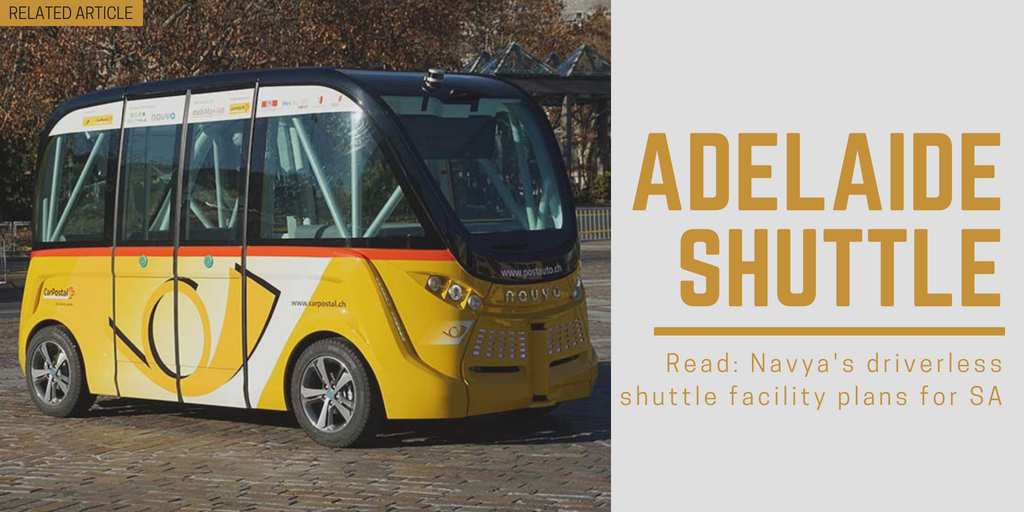THE FIRST driverless electric autonomous shuttle for South Australian public roads kicked off recently, part of a five-year trial incorporating the Tonsley Innovation District this week, it’s reported.
Known as the Flinders Express (or ‘FLEX’) – funded by the South Australia State Government and industry partners – it will initially provide ‘first mile–last mile’ shuttle services between the nearby Clovelly Park Train Station and Tonsley’s Main Assembly Building (MAB), then connections to bus stops on the main South Road and businesses within the Tonsley precinct, it’s stated.
Within a year the shuttle will run to the Flinders Medical Centre and the University’s Bedford Park campus before using main arterial roads around the entire Bedford Park precinct.
Flinders University head of civil engineering Professor Rocco Zito says commuters arriving by traditional bus or train to Tonsley can book a ride online at the Flinders website.
“Demonstrations and trials of these driverless vehicles that involve the community are a really good way of building acceptance of this type of new technology,” Zito said.
“Our aim is not to prove the technology but rather expose the public to this new type of transport service and learn from their responses and reactions to help driverless vehicles gain general acceptance.”
The Cost?
The three-stage, AUD$4 million driverless shuttle project – for which Flinders University, the RAA and Department of Planning, Transport and Infrastructure (DPTI) have partnered with industry supporters Cohda Wireless, Renewal SA, SAGE Automation, Telstra, UPG, ZenEnergy and public transport operator Keolis Downer – last year received AUD$1 million from the State Government’s AUD$10 million Future Mobility Lab Fund.
The French-designed Navya Arma electric shuttle can carry up to 15 passengers at speeds of up to 40km per hour, but will travel up to 30km per hour during the trial, organisers confirm. It’s reported at this top speed the vehicle will set a new record for driverless cars on Australian public roads.
FLEX will be managed by an on-board ‘chaperone’ informing users of the technology and ensuring safety.
SA Minister for Transport, the Hon Stephan Knoll, attended the official launch on 19 June, 2018, and was one of the first people to ride in FLEX.
Members of the public can book a ride from 20 June, with online bookings available via the Flinders University website at www.flinders.edu.au/flex-bus
“It’s not a question of if this technology will be on roads, but when,” Zito added.
“It’s all part of an awareness campaign to promote carbon-neutral transport options in South Australia. In order for driverless vehicles to become an integral part of our transport system we need to trial these vehicles in real operating conditions and encourage public participation and feedback,” he said.
“This research project is a perfect example of how universities, government and industry can collaborate to provide enhanced mobility services that can really make a difference to people’s lives.”
In one of Australia’s leading driverless projects, the vehicle will be docked within a six-bay solar-recharge garage to be constructed within two months near the Mitsubishi Administration building. The solar garage will also be available to the public wanting to recharge their own electric vehicles for free, it’s reported.
Transport operator Keolis Downer is involved with the Flinders project, having collaborated on the Navya autonomous shuttle projects in Victoria and other cities around the world including Paris, Las Vegas, and Montreal.
Many existing automobile manufacturers and new companies are expected to have driverless electric car models on the road by 2020, with the world market for autonomous electronic vehicles expected to be worth US$7 billion by 2050, organisers state.
Royal Automobile Association (RAA)
South Australia’s RAA started 115 years ago when a few pioneering South Australian motorists got together in 1903 to form it.
The SA RAA has been a powerful voice for South Australians, advocating for safer roads, safer vehicles and safer people, all while embracing new technology and supporting the developing needs of motorists, it states.
Representing more than 700,000 South Australians, the RAA says it is proud to partner with the South Australian Government and Flinders University, together with industry project supporters, to embark on the future of mobility and innovative transport solutions in the state.
“RAA has long recognised that driverless vehicles have the potential to be far more than just exciting pieces of technology,” said RAA president, Elizabeth Perry.
“In fact, many of us already use basic autonomous technology behind the wheel every day, with auto-breaking and park-assist now commonplace safety features in many of our cars.
“However, the evolution of autonomous technology has the potential to solve real personal and social issues, by enhancing mobility for children, the elderly and disabled.
“At the same time, there is potential to significantly reduce traffic collisions, and the resulting deaths, injuries and related costs.
“Autonomous vehicles also have profound implications for businesses in a range of sectors.
“By 2040, it is predicted that four out of every 10 vehicles on the road will be autonomous, with this growth segment opening up new opportunities and creating an impetus for innovation across a wide range of industries in South Australia,” she said.



